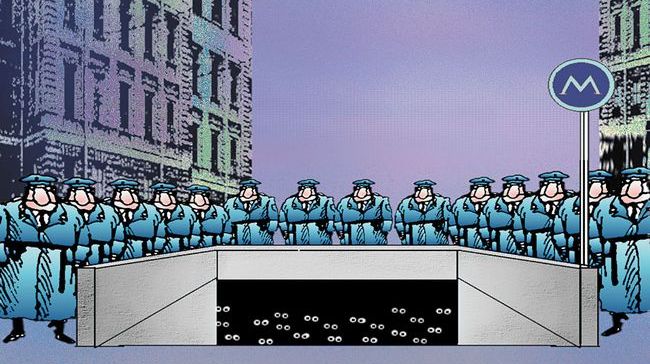The Kremlin’s “Thermidor”
Lilia SHEVTSOVA: “The erection of a monument to Ivan the Terrible should be seen as the Kremlin testing the public response to its movement towards darkness”
In recent days, a few unusual events happened in Russia: a monument to Ivan the Terrible has been erected in Oryol, while a monument to Prince Volodymyr the Great, a founding figure of Kyivan Rus’, has appeared in the Red Square. In addition, Russian President Vladimir Putin said at a business forum that Russia had had to intervene in the situation in the Donbas to protect the Russian-speaking population there, marking a break in the Russian government’s denial of any involvement in the aggressive war in eastern Ukraine.
The Day asked Lilia Shevtsova, a senior fellow at the Brookings Institution, Moscow, to comment on the abovementioned events and tell us about Putin’s likely actions regarding Ukraine and Syria, as well as the trends evidenced by Donald Trump’s stated intention to meet Putin even before the former is inaugurated as US president, provided he wins the election.
“The Oryol monument to Ivan the Terrible, one of the most murderous Russian tsars, is evidence of the age in which Russia finds itself today. ‘The darkness is growing denser,’ an observer said. And indeed it is. As the government is trying to keep control of the situation and preparing to reproduce the current regime, it is creating its own Thermidor by turning to an openly repressive tradition and attempting to find legitimacy in the past. But of course, glorification of Ivan the Terrible, who drowned Russia in blood and caused the Troubles, when the very Russian statehood was called into question – this is too much even for the Kremlin’s position. Therefore, no officials were present around the monument during the event. However, the erection of a monument to Ivan the Terrible should be seen by itself as the Kremlin testing the public response to its movement towards darkness.
“As for the monument to Prince Volodymyr, the creator of Kyivan Rus’, in the Red Square, this is one more symbolic step in the privatization of the past. After all, what is Muscovy without Kyivan Rus’? However, the Ukrainians have a reason to be proud, as they have captured the Red Square in that way!”
What new surprises should one expect from Putin on Ukraine regarding compliance or non-compliance with the Minsk II terms, following his revelations that Russia was forced to intervene to protect the Russian-speaking population in the Donbas?
“I think that strategy-wise, Putin is quite predictable. While he stays in the Kremlin, we can hardly expect any decision to leave the Donbas, i.e., comply with the security package of the Minsk Agreements as they are understood by the Ukrainian side. I think that for Putin, it would mean de-legitimization of his regime and a political suicide. I cannot imagine him going for it. This question will be considered by the Kremlin under Russia’s next leader. Putin is capable of actions which are perceived as chaotic zigzagging, though. But they are taken, again, within the familiar formula: let us push and create tensions in order to force them to come over to our position. The real issue is Ukraine and the West’s response to this formula. So far, at least, it has been the Kremlin itself which has restored the shattered European unity against Russia by sending a ‘nuclear ultimatum’ to America and threatening actions: Europeans agree that they need to think about deterring the Kremlin, but they do not know how to do it.”
What do you think about the statement of the Republican Party’s presidential candidate Donald Trump that if he wins the election on November 8, he will meet with Putin before the inauguration, which would be unprecedented in US history?
“I would not ascribe much weight to Trump’s statements. He says one thing in the morning and another in the evening. All his rhetoric evidences not just a lack of political education, but the twilight consciousness and inability to learn the basics of politics as well. By the way, his rhetoric runs completely contrary to the Republicans’ foreign policy doctrine. However, it is already obvious that Trump will not take residence in the White House. The majority of the Electoral College, which will elect the president of the US, will support Hillary Clinton, so we need to listen to what she says. Even her statements should be taken with caution, though. Usually, foreign policy intentions of the winner in the race for the White House are then ‘trimmed’ from all directions under the influence of a variety of factors and take a more moderate, ‘centrist’ shape.”
What should one expect from Rose Gottemoeller, who has recently commenced her term as Deputy Secretary General of NATO?
“Rose Gottemoeller is the first woman who has risen to such a high position in NATO, which testifies to her exceptional ability and respect she enjoys within the security community. Gottemoeller has always been cautious in her judgments, never jumped to conclusions, and tried to reach the heart of the issue. She has never had any liking for sweeping judgments. She has always encouraged pluralism and been willing to listen to different opinions. These are important qualities for a person in such a position. She is well-versed in all things Russian, having spent three years in Moscow as the director of the Carnegie Center Moscow. I think it was the best period in the center’s history. In her new position, Gottemoeller will not only pursue political objectives set by the new president of the US, but coordinate the positions of other NATO member states as well. I think she is a good choice for NATO.”
Newspaper output №:
№61, (2016)Section
Day After Day





